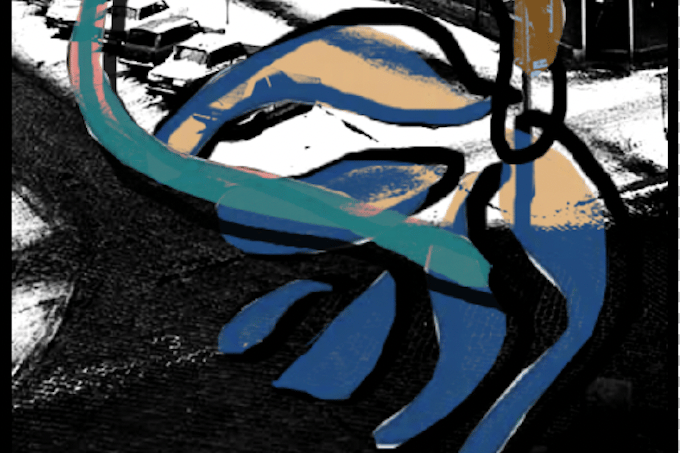From Localized To Polarized
This article explores the impact of corporate dominance on Brooklyn's live music scene, highlighting how DIY and independent venues struggle to compete against monopolistic companies like AEG and Live Nation. Interviews with Todd P., a veteran promoter, reveal that large corporate interests prioritize data mining and profit over creativity, leading to the decline of local acts and community-driven spaces. The piece underscores the urgency of preserving DIY and independent venues, which foster artistic innovation and community, in contrast to the homogenized, profit-driven model of corporate music venues.
Mia R Alonso
11/12/2019
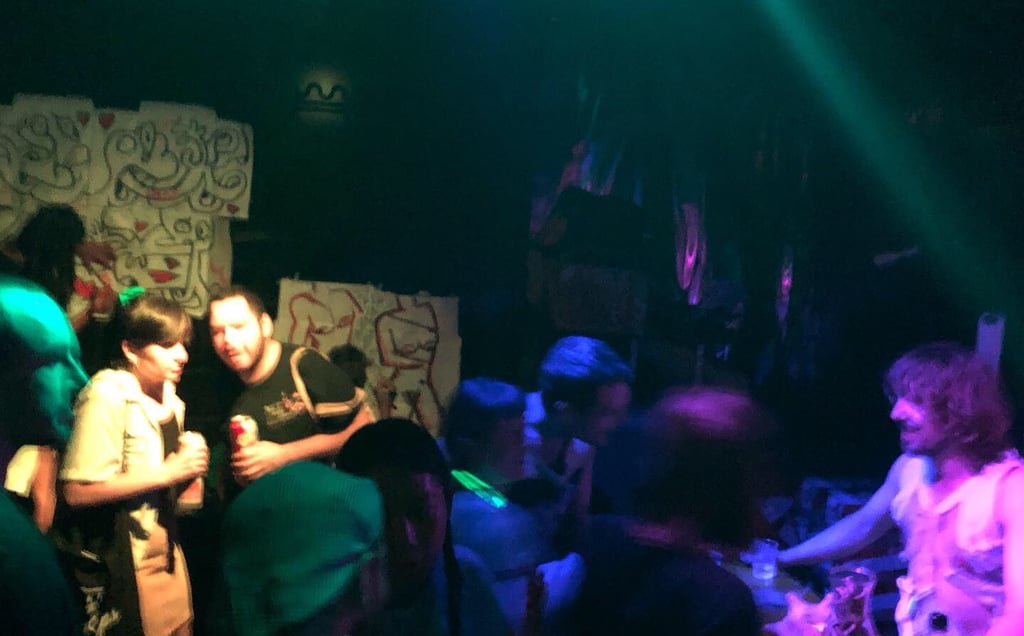

Brooklyn is the poster child of the post-internet and gentrified world of live music in the US today. We’re being slyly drained of our consumer control of music, living in the discolored watermarks left of a past era, fading into an even more extreme, monopolistic body of water. As a show goer in Brooklyn, I began this project by noticing the lack of local acts performing around town, even in the smaller venues. Almost every act was on tour. This was confirmed by a conversation I had with Todd P., longtime show booker and promoter for DIY venues in the 2000s in Brooklyn, like Glasslands, and now co-owner of independent venues, Market Hotel and Trans Pecos. Talking with Todd P., it became clear, the root of the problem has been the flooding of corporate music promoters and venues in the last decade within the city. Independent and DIY spaces are struggling to succeed with the bigger competition.
I met Todd P. in Market Hotel, when Surfbort, a Brooklyn originating punk band now in California, was playing a single release show. Todd P. explained to me in a later interview, “There’s so much money to be made at this, that big interests put their money into this, and I hate to say it, but the reason they’re putting their money into it, is not about ‘we’re making a return on our investments from selling drinks’, it’s because they want to mine user data. The reason these big clubs get the money they get is because the interests are looking to exploit the opportunity, as either a tax break or literally as a data mining operation with credit cards and online ticketing.” The interest by large companies in cities’ music scenes is a major wheel in the mechanics of the music industry nowadays and how difficult it is to maintain creativity outside of streaming and media platforms.
This is so urgent and relevant, since starting this piece two DIY venues closed; Secret Project Robot and The Glove, they were the last of the category in Brooklyn, the last with a consistent audience and shows. Then, there are Todd P.’s venues which are two of the few left independent music venues. There is a distinction between DIY and independent spaces that’s important to define but they are both mutually beneficial for the community and are made possible by community efforts and independent funds. DIY spaces are generally associated but not necessarily as being illegal spaces and very lo-fi, showing new or unknown local artists, and volunteer based staff. Independent spaces are usually more funded, legal, can vary in size, and can get touring artists. They both make most of their money from the bar and give all the box-office revenue to the artists. Both are working to create an anti-establishment path for creatives to have control over their production and relationship with the audience, and conveying a sense of democratic equality among participants in the space. These kind of spaces are the first pillar to create a system that builds long lasting fruitfulness and relevance, where the local and national public experience the breath of immortality and significance along with it. A feeling you get in the midst of solidarity, constant creative output and community blossoming in front of your eyes, and each of us realize we are or can be a part of it. Isn't that what we want?
Throughout the last decade, corporations have opened most venues in NYC, through big companies such as AEG (The Anschutz Entertainment Group). AEG is the biggest live entertainment company in the country, owning extremely popular festivals such as Coachella as well as concert promotion and venue management companies such as Golden Voice (West Coast Cities) and The Bowery Presents (NYC). These different companies invest millions of dollars into their venues and completely disrupt the relationship between the audience and the artist. In 2016, two of the first venues that created later The Bowery Presents; Mercury Lounge and Bowery Ballroom, left to form their own company called Mercury East Presents. In doing so they merged with the multi-billion dollar Live Nation Entertainment company where Ticketmaster is a subsidiary company. Live Nation and Golden Voice are the major promotion and venue management companies based in San Francisco, a city whose DIY and independent spaces are also being challenged by these competitors. These corporate connections and manifestations show the monopoly takeover of most of the country’s music venues, not leaving much room for diversity or local participation in what’s being popularized.
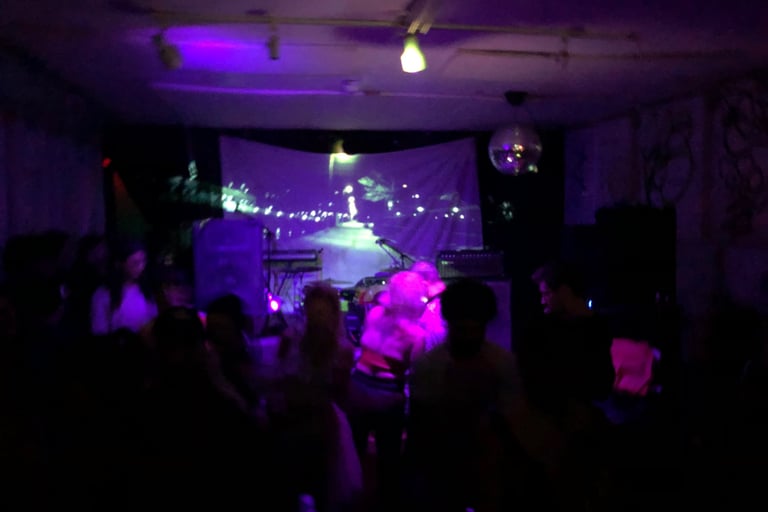

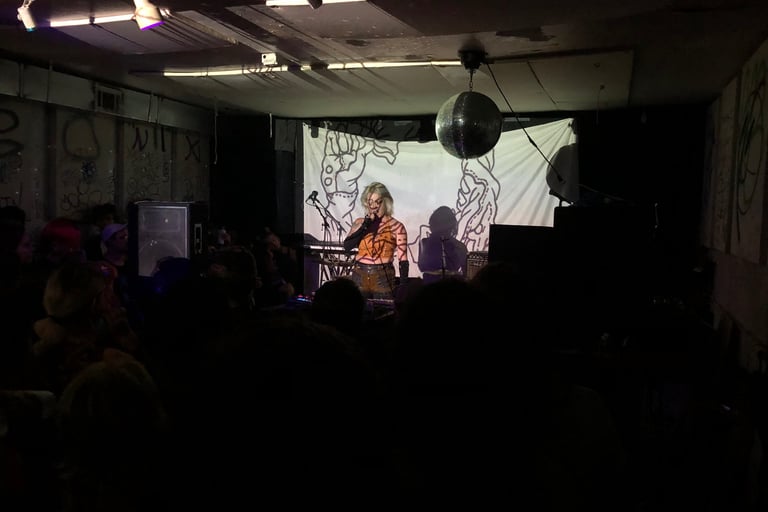

As Sam Lefebvre summarizes in his article Will Corporations Ruin Live Music in the Bay Area?, “Package tours, wherein an artist plays only venues operated by Goldenvoice or Live Nation, undermine the expertise of local promoters; that's how an artist with little San Francisco draw ends up in a too-big venue, without a well-chosen slate of local support.”
This is the business plan of these corporate music venues to keep bands in the market they created and network of venues and platforms as the band climbs the popularity ladder through streaming and social media. In this process you can see how audiences are not in control of who becomes big, these venues bring in a band that aren’t locally popular in a city, and therefore, they don’t gain local exposure due to the higher ticket price for bands lacking local fans or exposure. So what happens is these companies keep a relationship with the bands that survive this business strategy as they grow with social media, fill up their larger venues until they get to the festivals. This is apparent when you look at how how these individual companies are expanding themselves as well to meet the competition. The Knitting Factory, a former independent venue that now makes part of The Knitting Factory Entertainment, a multi million dollar company that contains three music clubs, four restaurants, an artist management company, a record label, and now, sponsors Desert Daze Festival. With all of these parts feeding into each other, they recycle bands having them grow within their web of platforms for the ultimate profit.
You look at some of the biggest people to come out of NYC in the last decade like Crumb, Gus Dapperton, The Drums, and Beach Fossils, on their most monthly listeners list on Spotify, NYC most of the time won’t even show up in their top 5. It’s why culturally significant and local music scenes that extend past friend groups are becoming impossible for Brooklyn and many other cities to foster. Bands are instructed by their managers to instead of playing at local independent venues, to wait for the festival or corporate venues like Bowery Ballroom, because they will pay more and increase the bands market value; making their rates too high for independent spaces to afford. This is why on the night Surfbort was playing in Market Hotel, the guitarist of this Brooklyn band with traction and following, told me they hadn’t played in Market Hotel in three years, a venue they could be regulars at, and could gain a lot of local notoriety. Since then they have played a lot more shows at Market Hotel, specifically, and in Brooklyn, now one of the most active bands in Brooklyn.
In contrast with those more commercial and corporate events, on another occasion, I went to a show at The Glove where four music acts were playing for $5. The venue is on the second floor of a small building in Bushwick that fits about 40-50 people. In the front a small room used as a gallery, which was displaying a photography show by two artists. I got there for the second act; Madeline Jaina, a solo act on acoustic guitar singing indie-folk songs and a few jazz standards. Between each act was a lip sync show from a Drag Queen. My favorite that night, was a creative and entertaining performance of Mitski’s, Nobody, a choice I don’t think anyone would be able to expect for a drag performance but got one of the biggest reactions.
One of the main challenges for these authentic and smaller spaces to exist is the fickle audience turn out. The turn out in DIY and independent venues are not consistent, and they often have a hard time getting a good crowd to come. Which I believe is caused by what Todd P. said, “No one wants to go to a space that doesn’t feel cool, and then going to the spaces is what makes a space cool. So how do you reverse the trend? I think that it’s all related to money and it’s all related to the internet”. People rather go to Baby’s All Right (who has 40k followers on instagram), then Trans Pecos, (who has 14k followers) on a friday night, a venue that had 5 million dollars invested into the space according to Todd P. and adopts the intimate space of lofi venues. The competition between these spaces prevent independent spaces to reach their potential from lack of consistent funding and audience. This then leads to a challenge in fostering bigger acts or attracting them. For example, when I went to the independent venue Sunnyvale (4k followers) in September to see Tall Juan raising funds for the Amazon fires. Not many people attended, maybe between 30-40. I was surprised because Tall Juan had been playing shows in Brooklyn for years, lived with Mac Demarco, and has played larger venues like Market Hotel, just in the past summer. Also, the show was for a fundraiser connected to climate issues, which I expected was going to be a big draw for people, in the context that there had just been the huge Manhattan climate march.
It becomes evident that within this new cultural system, money and social media presence is how you get an audience, it’s how you get the music acts and why there aren’t that many Brooklyn based artists right now that are playing in neither the corporate or independent spaces. Deregulated financial power continues to undermine creativity, and the effects have in this overpopulated and social media-trend driven culture are devastating and profound, truly jeopardizing, not only artistic survival but innovation and counter-cultural efforts.
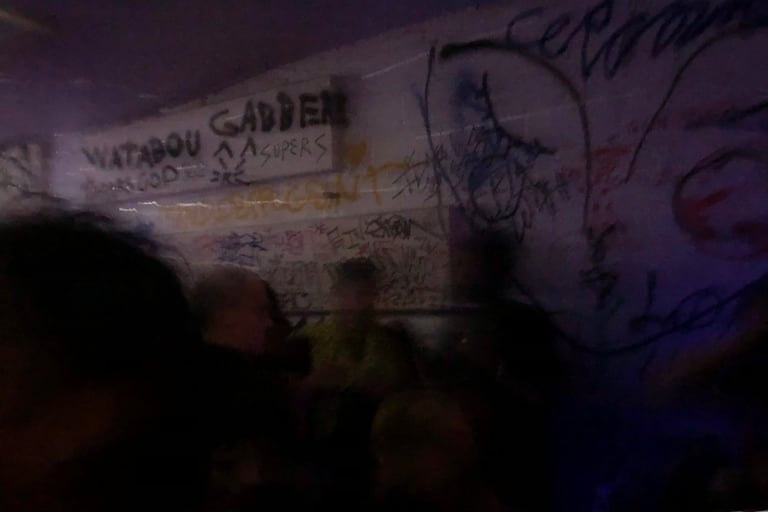

fig. 3
fig. 2
Event at venue The Glove. fig. 1
fig. 4
Image Credits
fig. 1-4 : Photo by Mia R. Alonso, 2019
Portfolio
Explore my writing and graphic design projects.
© 2024. All rights reserved.
